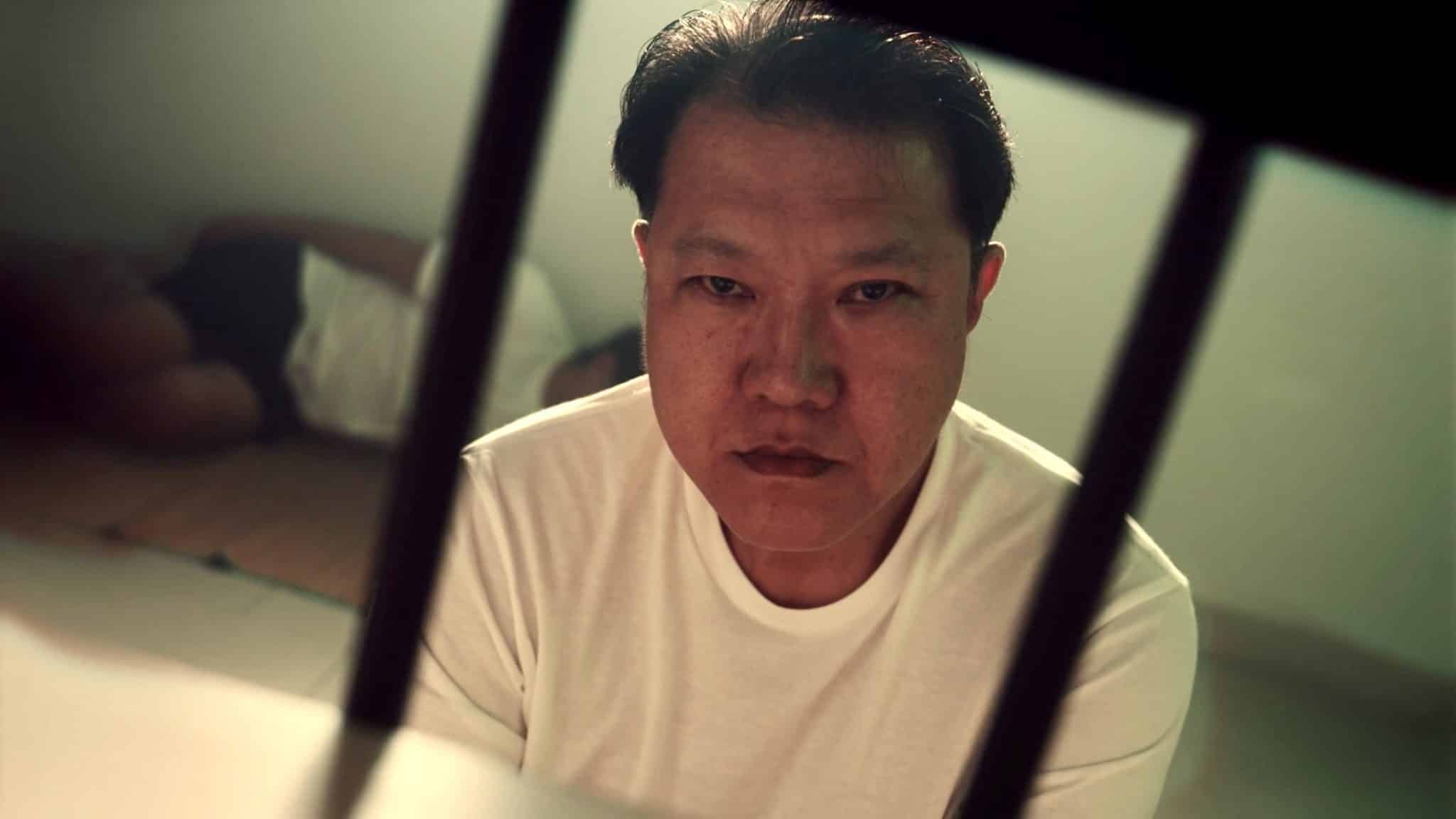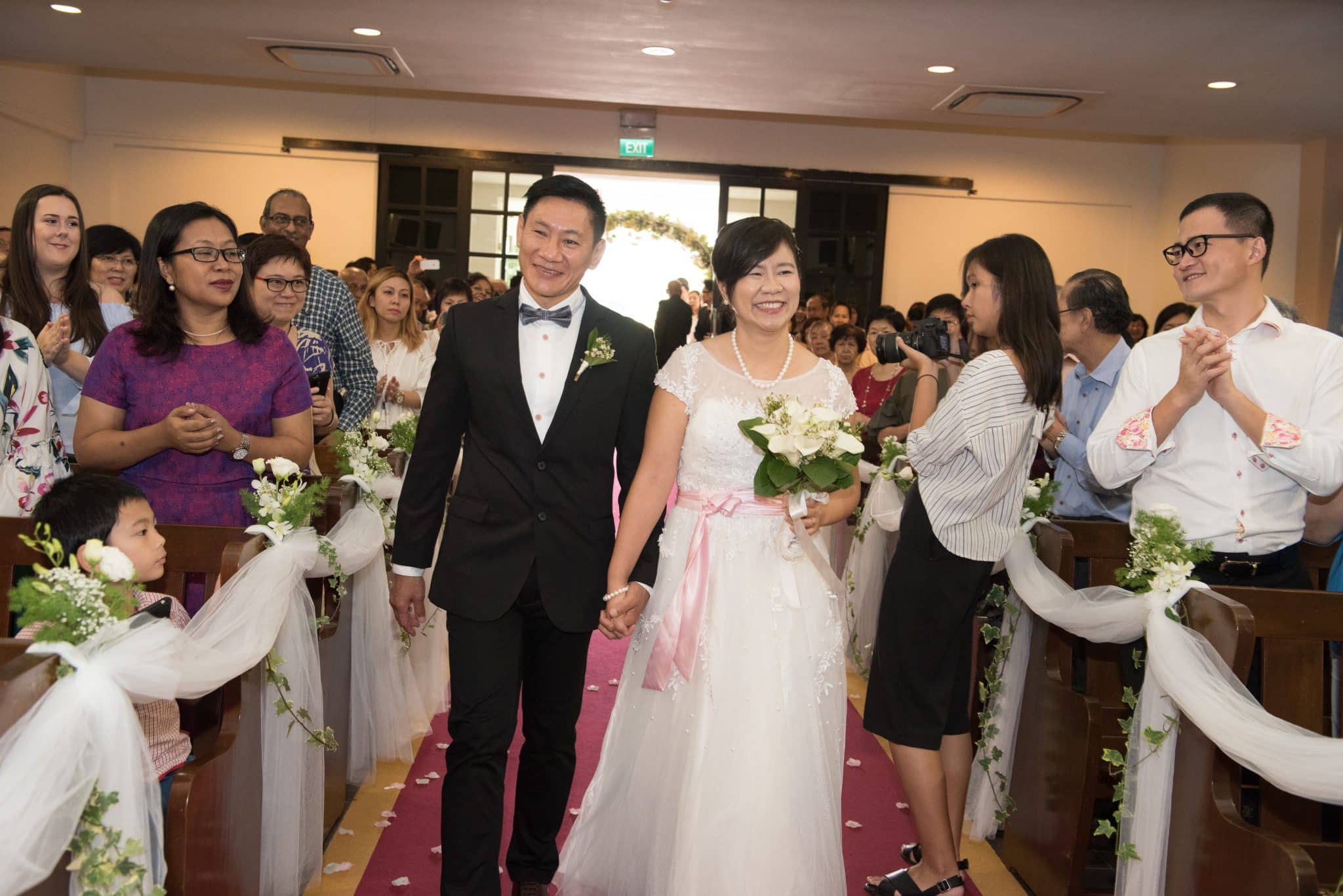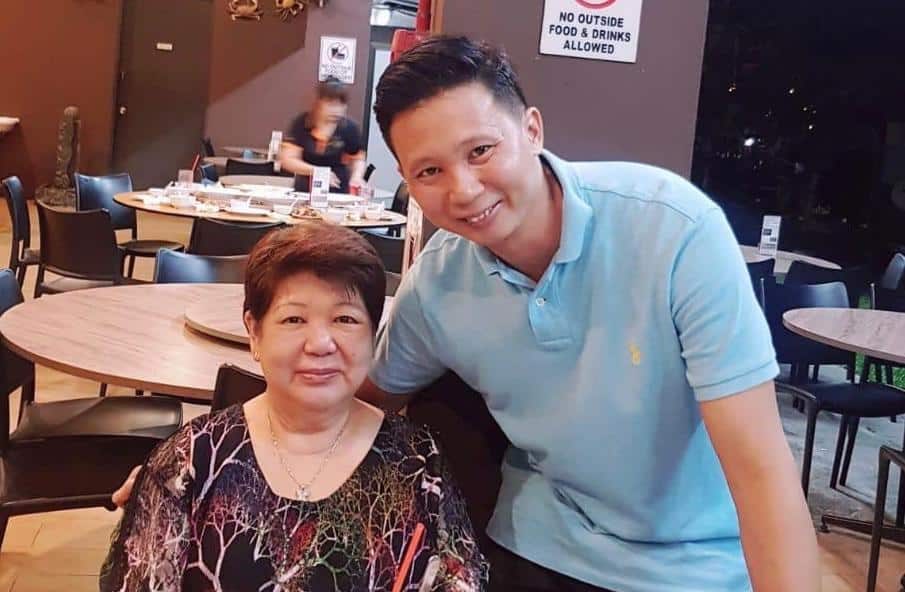The mum at The Helping Hand who never knew a mother’s love
Salt&Light celebrates mums this weekend. Blessed Mother's Day!
by Christine Leow // May 7, 2021, 6:37 pm
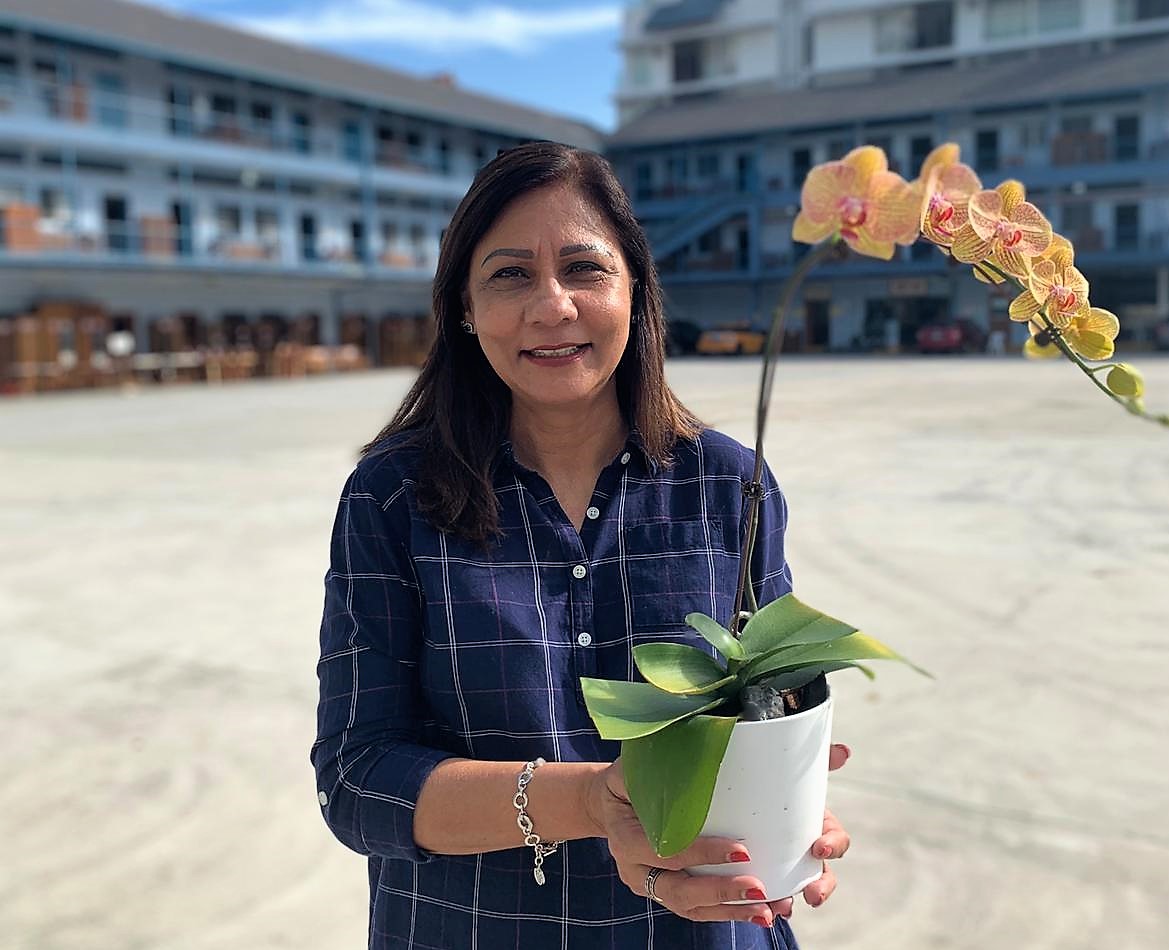
Ranjit Kaur works as a business manager at The Helping Hand and is now in charge of their orchid sales for Mother's Day. Her motherly instincts have led her to befriend a few residents there and share her experiences standing by her husband as he worked through his drug addiction. Photo courtesy of The Helping Hand.
Ranjit Kaur has three sons aged 32, 29 and 16. There is pride in her voice when she says: “The oldest is getting married this month.”
“I always feel like (the former drug addicts) are my kids.I talk to them, tell them there is hope.”
Her motherly instincts extend to some of the young men who come to The Helping Hand (THH), a men-only halfway house for former drug addicts.
Though she is a business manager at The Helping Hand and there are already counsellors to journey with the residents, she sometimes takes it upon herself to befriend those she feels need a little motherly love.
“I always feel like they are my kids. I talk to them, tell them there is hope,” says the 55-year-old.
Kaur knows something about hope.
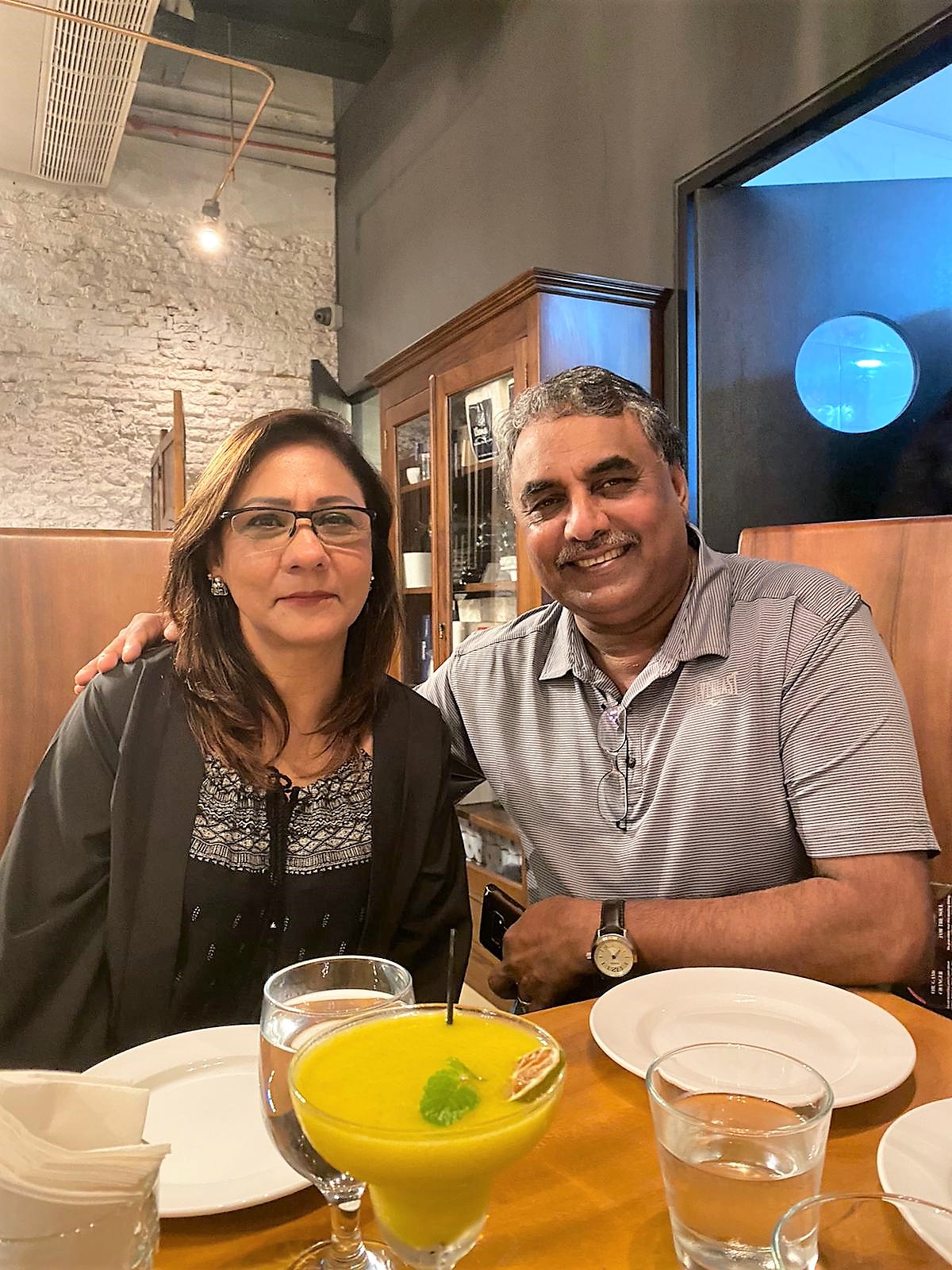
Ranjit Kaur and her husband Ranjit Singh met when she was 20 and he was 24. She did not know he was addicted to drugs at the time. Photo courtesy of Ranjit Kaur.
She was once a runaway who ended up married to a drug addict. She was once a struggling young mum holding down two jobs and still not making ends meet. Her life was once marked by poverty, uncertainty and despair.
“I wake up every morning and thank God that I am alive … We have a roof. We don’t lack anything.”
Now, all that is behind her.
Her husband has been clean for decades and is a counsellor at the Institute of Mental Health (IMH), helping those struggling with addiction.
“This is all God,” she says.
She certainly never expected to be where she is today and she has never forgotten Who has taken her this far.
“I wake up every morning and thank God that I am alive. I am so contented. I have a job. We have a roof. We don’t lack anything.”
Looking for love
The mother figure did not have a good relationship with her own family, especially not with her mother. She and her younger sister were raised in an extremely strict household.
“It was very difficult. We couldn’t have friends or communicate with anyone. We couldn’t go out.
“I had only two Punjabi dresses to wear, and only one pair of shoes and one bag. We were not allowed to wear jeans.”
“I was looking for love. Coming from a traditional family with strict parents, you don’t get love because you are a girl.”
When Kaur started working at 16, her salary went straight into her mother’s bank account. She was not allowed to have any money of her own.
“I ate breakfast at home and my mum would pack lunch for me. We couldn’t eat what we wanted.”
Kaur resorted to working long hours – 7am to 11pm – so she could stay away from home as much as possible.
She was 20 when she was introduced to 24-year-old Ranjit Singh, the man who would become her husband. It was love at first sight.
“He was very loving, very caring. He would call me and check up on me: Did I have my breakfast? Did I have my lunch? Did I get home safely?”
On hindsight, Kaur realises why the attraction was so strong.
“I was looking for love. Coming from a traditional family with strict parents, you don’t get love because you are a girl.”
Hopeless devotion
Within months of dating, there would be trouble in paradise. Singh got arrested for drug consumption and was sentenced to nine months in prison.
Says Kaur: “I didn’t even know he had been arrested. I was searching for him and his brother told me he was in prison.”
“I told him I wouldn’t leave him. Everybody should be given a second chance.”
Up till then, she had no idea Singh was a drug addict.
“Now I know how a person looks, his behaviour and actions when he is addicted. But back then I had no clue what a person on drugs was like.”
She visited Singh in prison and he gave her a chance to break up with him.
“I told him I wouldn’t leave him. Everybody should be given a second chance.”
Kaur admits that she was naïve then. She had not expected that getting out of drug addiction could be so difficult.
“My father used to drink alcohol and he gave it up within a day the moment he developed high blood pressure. I thought: If my dad can change, other people can change too.”
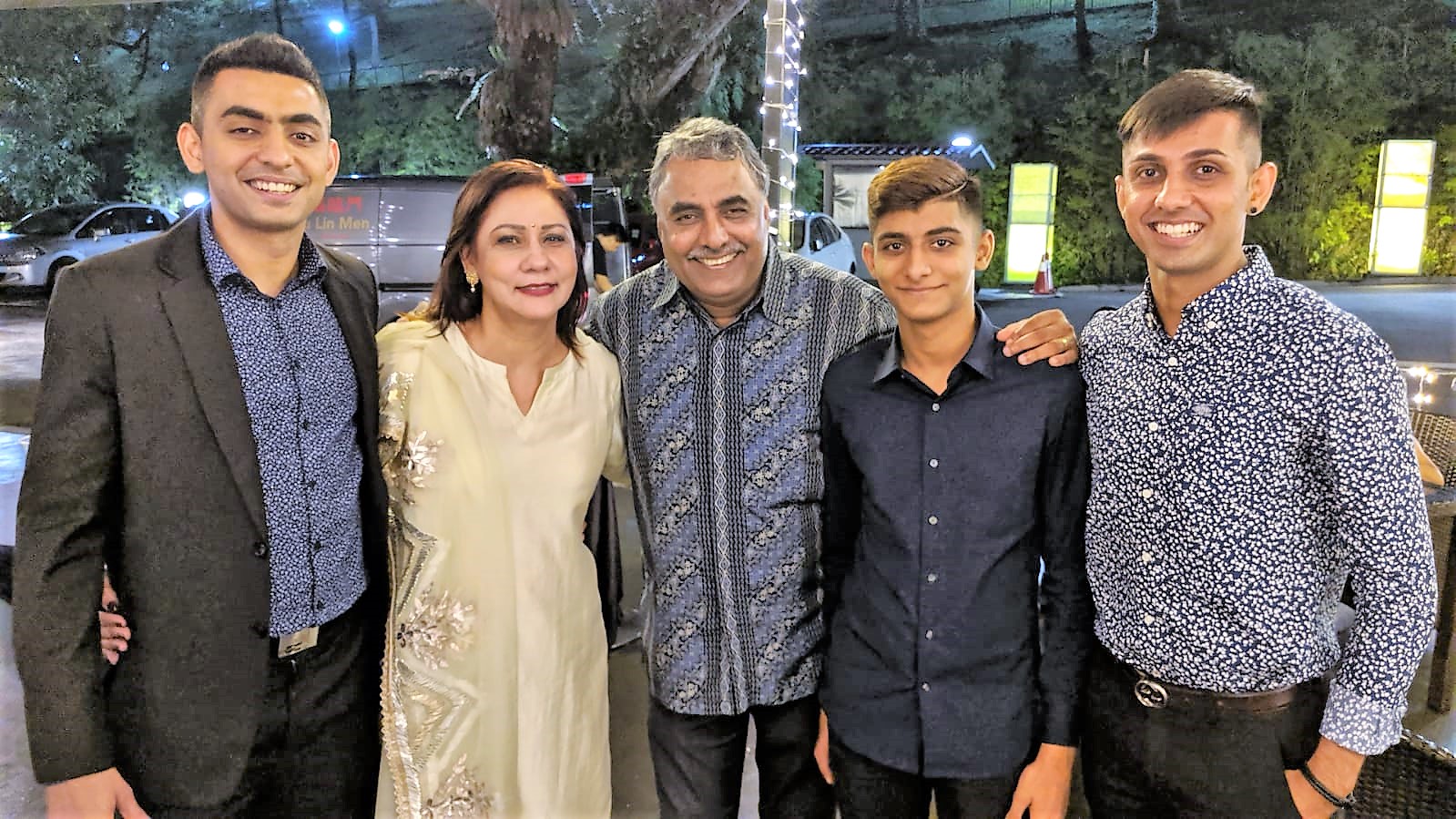
Kaur (2nd from left) with her family: (Left to right) her oldest son, her husband, their youngest son and their second son. The family went through difficult times financially and emotionally when Singh tried again and again to kick his drug habit. Photo courtesy of Ranjit Kaur.
Having pledged her love to Singh, Kaur decided to come clean with her family. She told her father she was in love.
“They were devastated that something like that could happen when they had been so strict.”
Her mother arranged to send her to India to be married.
“I was thinking: Either she takes me in or I will commit suicide.”
That was when Kaur ran away from home, making her escape in the dead of night with just 10 cents – enough money to make one phone call.
“I called my (future) mother-in-law and told her that I had left my house. I was thinking: Either she takes me in or I will commit suicide.”
Thankfully, the older woman let Kaur live with her family.
But her troubles were far from over.
“My parents made a police report. They pleaded with me, they wanted me back. But I knew if I returned, they would pack me off to India. I made a police report. It was such a mess.”
When Singh was released from prison, the two registered their marriage. She was 21 by then and he was 25.
A rocky marriage
But married life did not bring the freedom Kaur had hoped for.
Her mother-in-law was as strict as her mother. On top of holding down a job, Kaur was expected to take care of the household. So, Kaur cooked and cleaned for the family and packed meals for her father-in-law to take to work every day.
When Singh was 12, schoolmates introduced him to smoking. Soon, it progressed to drinking. By 14, he was into drugs.
Singh was back on heroin. Kaur had no friends. She found herself alone once more. But she did not blame her husband.
“When your parents are so strict, there is no communication, no love. He was looking for love too.”
Kaur tells Salt&Light that Singh was a timid, quiet child who did not have many friends. When he was 12, schoolmates introduced him to smoking. Soon, it progressed to drinking. By 14, he was into drugs.
“It made him feel better when he drank and took drugs. He had more friends. So he continued.”
A year into the marriage, their first child was born. Fatherhood did not change Singh.
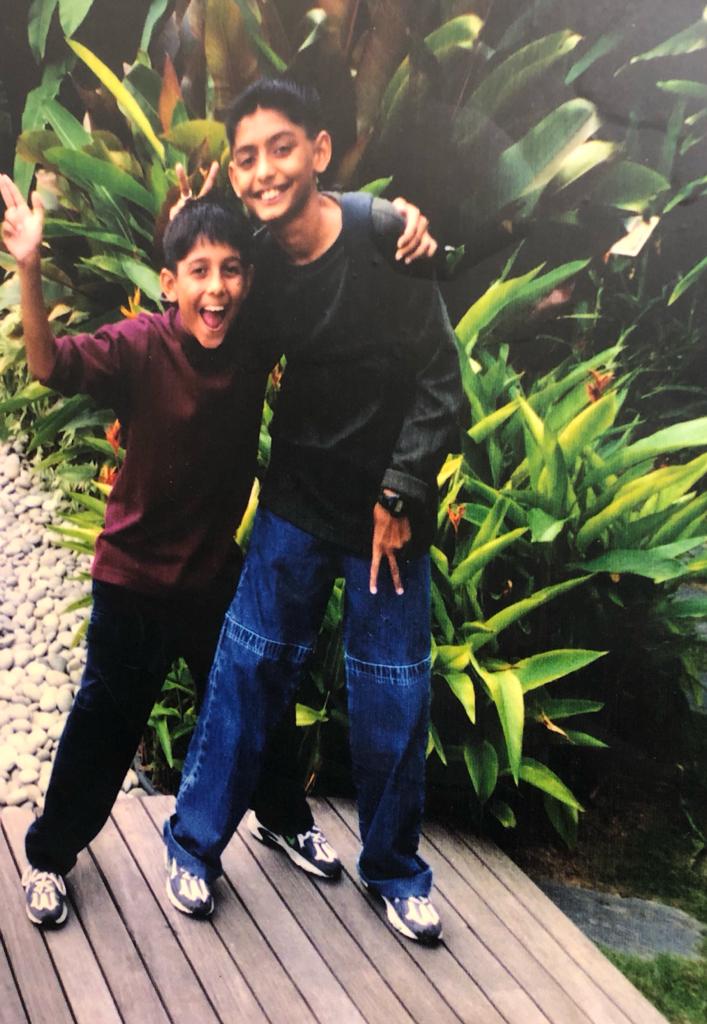
When Kaur was pregnant with their second child, she gave Singh an ultimatum – get clean or she would leave. Singh took her words to heart and went into rehabilitation at The Helping Hand to kick his habit before the baby was born.
“When someone is on drugs, they become very self-centred, they can’t understand anything around them.
“The addiction takes over them fully. Drugs is like a disease, like cancer.”
Until his arrest and imprisonment, Singh had been running his own carwash business. The business closed down during his prison term.
“He stole from home. All my jewellery was gone.”
He worked odd jobs but the money went not to his wife and child but to his drug habit. When his daily-waged job as a courier could not pay for the drugs, he stole.
“He stole from home. All my jewellery was gone.”
Despite their dire financial situation, the young couple managed to put together enough money to buy an HDB flat so they could make a life of their own outside the strict confines of Singh’s family.
“We had to move out secretly on a weekday when no one was home. When my mum-in-law came to know about it, she was very upset. She did all her drama.
“I always keep quiet when there are quarrels. My husband loves his mum and he loves me. So he was torn.”
An unexpected encounter
The new start they thought they would have with the move never came. Singh continued to be addicted to heroin even though he wanted to quit.
Despite not being particularly religious, the couple sought spiritual help when all else failed. They visited the temples of different religions and even went to Malaysia to see mediums.
“At times, I had to borrow money from my boss. Colleagues would buy food for me for lunch.”
“I just wanted my husband to change by whatever methods.”
But the addiction continued.
Kaur took a second job to supplement the family income because her husband became so addicted to drugs that he could no longer hold down a job.
“I was paid very low (in my first job) and I had to give money to my husband for his addiction plus (there was) our son’s expenses and the cost of travelling up and down.
“At times, I had to borrow money from my boss because my husband took my money. Colleagues would buy food for me for lunch.”
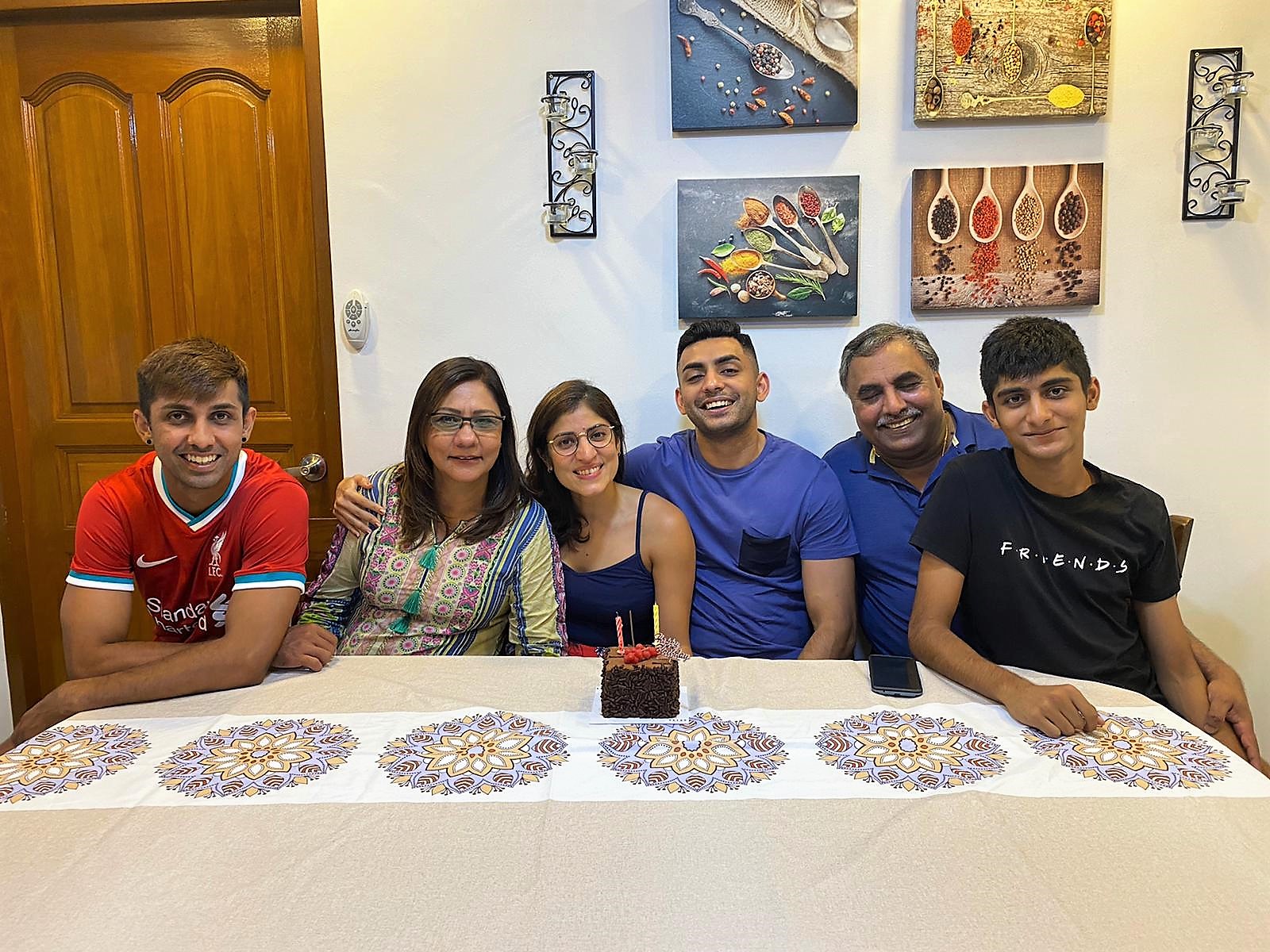
Kaur (2nd from left) at home with her family: (Left to right) her second son, her future daughter-in-law, her oldest son, her husband and their youngest son. By God’s grace, the family’s life turned around after Singh became involved with The Helping Hand. Their sons have successfully stayed away from drugs. Photo courtesy of Ranjit Kaur.
Then, the police showed up at their door because Singh failed to pay his parking summons and road tax. Soon, narcotics officers also turned up. To avoid them all, they moved back to their respective parents’ homes.
When Kaur became pregnant with their second child, she knew drastic measures were needed.
“I told him, ‘I think we have to part ways because I can’t have you with me and not being of any help.’”
Then, the unexpected happened.
Singh was smoking heroin in a public toilet when he saw a flyer about a cocaine addict sharing how God had transformed his life.
Singh was smoking heroin in a public toilet when he saw a flyer about a cocaine addict who had kicked the habit and was going to share his testimony of how God had transformed his life.
Desperate, Singh attended the talk at a church.
“He walked in and he started crying when the preacher was talking.”
A member of the church who was helping out at the talk approached Singh and befriended him.
“My husband told him, ‘I’m on drugs. I need help.’ And this man started to look for help for him.”
The man would go on to introduce Singh to The Helping Hand – a move that would change Singh’s life. Now, 29 years on, the two men are still friends.
A helping hand
After Singh enrolled in THH’s stay-in programme, he called his wife and asked for one more chance.
It was a request Kaur was familiar with.
Reluctant at first, she eventually relented, visiting Singh every Sunday. “I had no choice. I had no friends, no parents to support me. I only had him.”
Then, as the weeks became months, Kaur started to see a change in her husband.
“He decided to accept God and put Him in the centre of his life. When he told me that he had given up drugs, I couldn’t believe it.
“But then I saw him healthy, looking good, taking care of himself, he was so different from the way he used to be.
“When he told me that he had given up drugs, I couldn’t believe it.”
“It took me three to four years to believe that he had really changed because how could this God actually change someone’s life?”
Singh stopped going to places that would trigger his addiction. He stopped going out alone altogether.
Says Kaur: “If he wanted to go out, he would ask me to follow him. He didn’t want to meet his old friends or be alone in places that would trigger him to take drugs again.
“For a few years, it was like this. I had to go with him everywhere.”
The programme was so good for Singh that when he graduated in nine months, Kaur convinced him to stay on as a helper.
Singh had wanted to get a job elsewhere to support the family. But Kaur did not mind the modest allowance he would get at THH, not if her husband could remain drug-free.
“People asked me how we survived. It was just God’s grace. God is really good.”
“He had tried to kick the habit at home but it was impossible. He could get drugs easily.
“At THH, there are people around him, counselling him, talking to him. There are devotions, prayers, Bible reading. He needed that. It cannot happen outside.”
By then, Kaur was no longer working because she needed to care for their two sons.
To supplement the family income, they rented out one room of their HDB flat. THH founder Robert Yeo gave Singh a motorcycle so he could commute cheaply. An anonymous donor sponsored the family $200 a month for five years. Singh was also allowed to bring lunch and dinner from THH home for his family.
The family learnt to live simply. There were no shopping sprees. Outings were trips to the playground. Kaur put her children in cloth napkins in the day and toilet-trained them early so they could save on diapers.
“People asked me how we survived. It was just God’s grace. God is really good. Our bills were always paid, we were happy that there was food to eat. We were contented.”
A life transformed
Kaur was going to church weekly with her husband by this time. He was a Christian but she still had her reservations.
“I was afraid of what my community would think of me. I was already an embarrassment because my husband was a drug addict.
“If I gave up my religion to become a Christian, I would be an embarrassment to my parents.”
“By the time we got to the Singapore customs, I said, ‘Okay, I’m ready to become a Christian.’”
Three years in, she was on her way home from a church camp in Malaysia. Seated in the pastor’s car with his wife and Singh, she received a personal sermon from the pastor.
“He preached and shared Bible verses about how God died for our sins, who God is and where we go when we die.
“By the time we got to the Singapore customs, I said, ‘Okay, I’m ready to become a Christian.’
“I could see the difference between Christians and other people. They didn’t know me, yet they loved me so much. They didn’t care that my husband was a drug addict.
“When I was in trouble, who was there for me among the people I knew? Nobody. So why should I care what they thought?”
Over the years, the couple has turned their experience into teachable moments for their three sons.
“They even help their friends who are in trouble with drugs. They get their father to talk to them.”
When one of their sons went through a rebellious stage, “going out in the night, drinking, fighting, mixing with the wrong people and not doing well in school”, Singh stepped in.
“My husband spoke to him. My son realised that his friends would not always be there for him.”
Each of their sons has kept away from drugs.
“They even help their friends who are in trouble with drugs. They get their father to talk to them.”
In time, Kaur started working at THH too. At the half-way house, she has reached out to some of the residents on her own time, listening to them, counselling them and, sometimes, sharing hard truths from her own experience.
“One man I talked to told me, ‘My wife doesn’t forgive me. She’s so angry with me. My daughter doesn’t want to talk to me.
“But how much have you hurt your family? Where were you when your kids were growing up?” Kaur asked them. “Many addicts don’t understand that they need to win their family’s love again.”
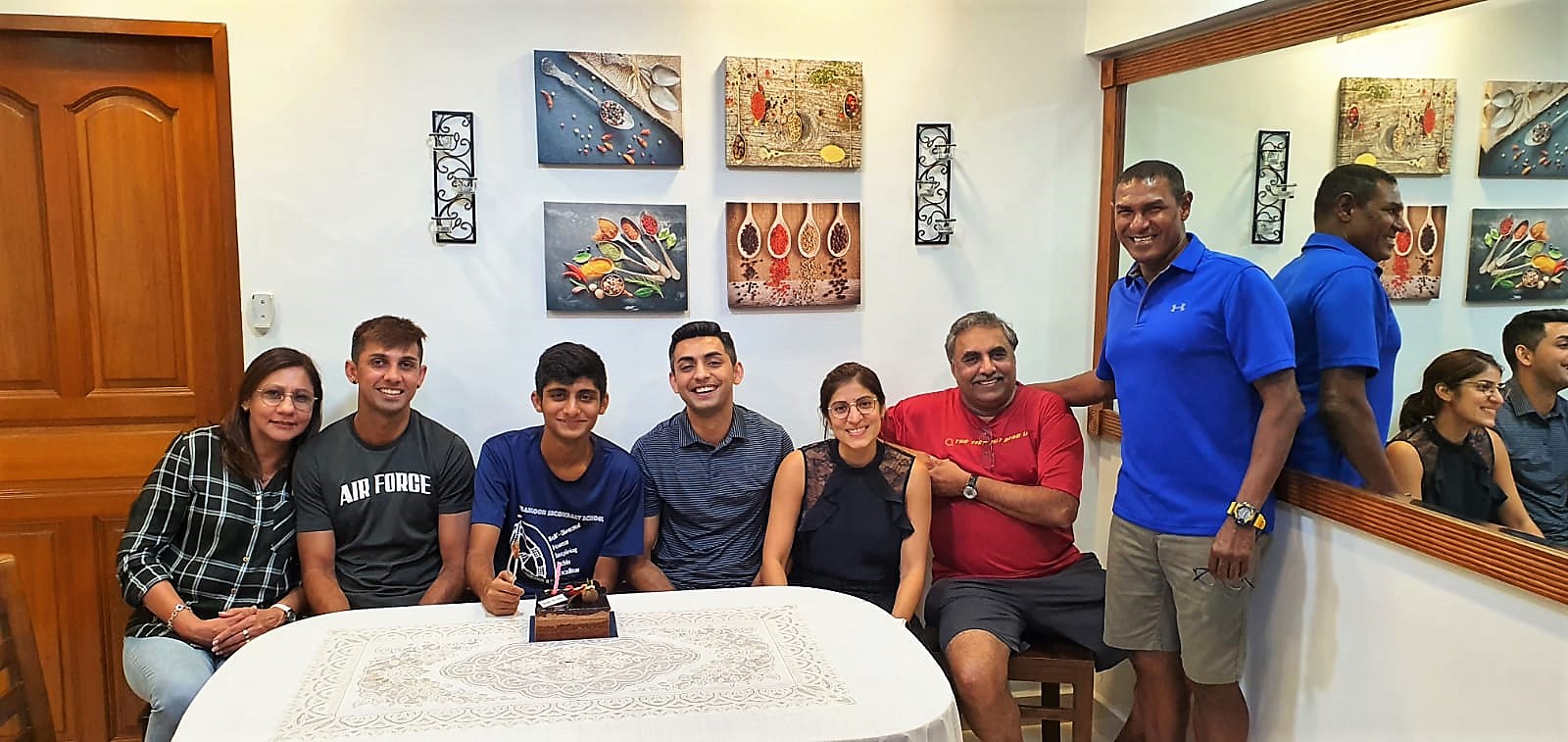
The family with Kaur’s colleague (far right) from THH whom they befriended. At THH, the men have devotions, prayer and Bible reading besides drug rehabilitation. Photo courtesy of Ranjit Kaur.
Then there are those whom she and her husband have taken under their wings. One man who left THH 10 years ago, and now lives in Malaysia, is still in touch with the couple.
“Knowing the true, living God transformed my life.”
“I talked to him about family life, about his wife. Whenever he comes back to Singapore, he comes to see us.”
Another man whom she befriended five years ago now works with Kaur at THH.
“He comes to my place for dinner, spends time with my husband who talks to him and advises him. My kids are also very close to him.
“He is more like family to us. Any problems, he will call me and my husband and talk to us, like how to manage his grown-up daughter.”
Her difficult journey supporting her husband’s battle against drugs has given her a deeper understanding of the struggles of addicts. Her faith in God has given her a special capacity to love.
“Knowing the true, living God transformed my life. I was hurt and angry, very vengeful.
“God slowly, through His grace and mercy, moulded me.”
Orchid sale at The Helping Hand
If you are looking for a floral gift or centrepiece for a special occasion or need flowers for your company or church, The Helping Hand has extended its Mother’s Day orchid sales.
Prices range between S$50 and S$80. You can order your indoor orchid arrangement or outdoor pot of orchids here.
Proceeds go towards The Helping Hand’s rehabilitation programmes for former drug addicts.
RELATED STORIES:
Smoking by 8, wanted in Singapore by 25: This “no hope” prisoner is now a pastor
We are an independent, non-profit organisation that relies on the generosity of our readers, such as yourself, to continue serving the kingdom. Every dollar donated goes directly back into our editorial coverage.
Would you consider partnering with us in our kingdom work by supporting us financially, either as a one-off donation, or a recurring pledge?
Support Salt&Light